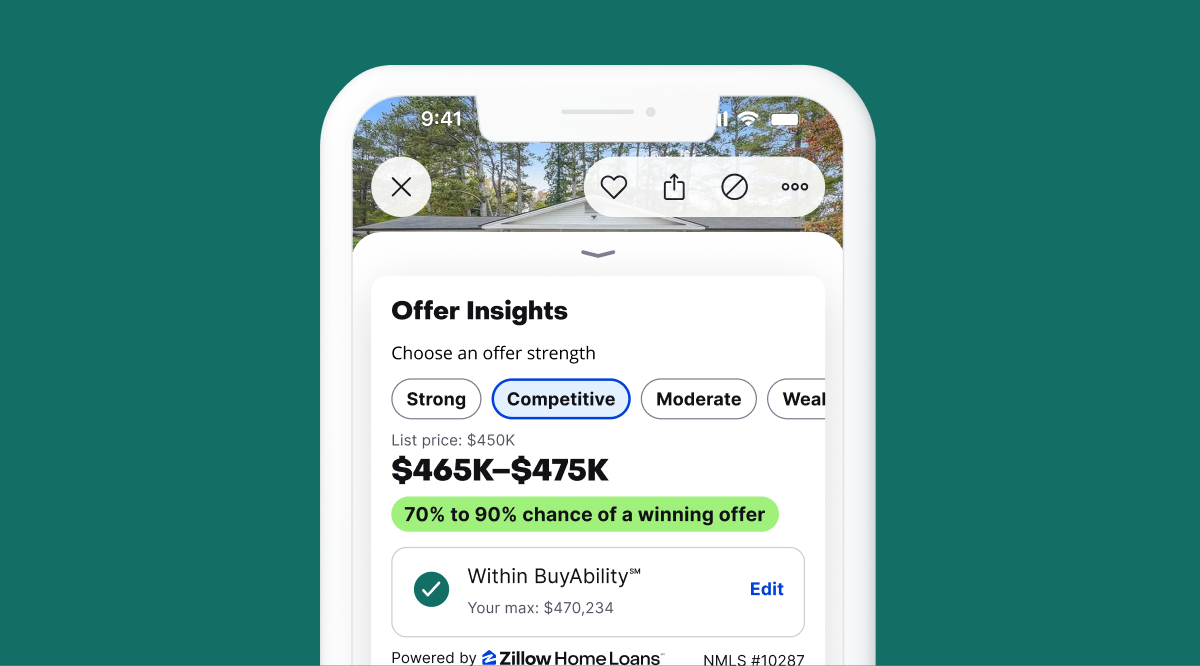How to Make an Offer on a House


Written by Jennifer Lyons on September 22, 2025
Reviewed by Jeff Rankin and Orphe Divounguy
Key takeaways
- An offer on a house includes price, contingencies, earnest money, and a proposed closing date.
- Strong offers are backed by a mortgage pre-approval and competitive terms like flexible move-in dates.
- Sellers may counter, accept, or reject a buyer’s offer; be prepared to negotiate on key points and lean on your real estate agent for guidance.
Making an offer on a house is equal parts exciting and nerve-wracking. After all, it’s the point in the home-buying process where the right move can secure you the keys to your future home. Whether you’re buying for the first time or you’re a seasoned homeowner, knowing how to make a great offer can help you stand out in a competitive market.
From determining a fair price to including contingencies, every detail matters. In this guide, we’ll walk you through the steps to confidently make an offer on your dream home.
1. Preparing to make the offer
Proper preparation ahead of time will help give you a competitive edge when it comes time to make an offer on a house.
Find the right home for you
Step one involves finding the home that feels right for you. Start by exploring listings on Zillow to get a feel for homes available in the area you’re looking to buy. You can even compare various neighborhoods and check out local amenities. Visiting open houses can help you better understand the features you want in a home. A real estate agent can help you gather information about a specific home, neighborhood or market.
Know your budget
Before you can put in an offer, you need to know how much you can realistically afford. That means evaluating your income, monthly expenses, and any savings you might have. Be sure to factor in property taxes, insurance, HOA fees (if applicable to the house), and any maintenance or improvement costs. This step is important for making a realistic offer on a house. You can use Zillow Home Loans' BuyAbility tool to estimate your home buying budget using real-time interest rates. The tool will then personalize your search for homes on Zillow, so you can find homes that fit within your budget.
Get pre-approved for a mortgage
Getting pre-approved for a mortgage is a huge step forward in the home-buying process and will be a bonus when making an offer. A pre-approval letter from a reputable lender shows sellers you’re a serious buyer with financing already in place. It also gives you a clearer sense of how much you can borrow on top of what you have saved for a down payment.
Note that pre-qualification and pre-approval aren’t the same. Pre-qualification is an informal first step that relies on basic information the borrower shares with the lender, whereas a pre-approval requires document verification. You can get pre-approved for a mortgage with us at Zillow Home Loans* to learn more about your eligibility.
Determine your offer price

Falling in love with a home can make it tempting to go in with a high offer to ward off competition, but the best offer isn’t necessarily the highest one. A strong offer is based on solid market research and reflects the home’s actual value, not just what you'd like to pay. This is where a real estate agent becomes a powerful ally. You can partner with a Zillow partner agent to get expert insights into the price of nearby comparable homes, the condition of the property, and how competitive the local market really is.
Combine your agent's support and negotiation know-how with Zillow’s new Offer Insights tool to create a strategic offer leveraging data-backed insights. The tool uses Zillow’s Zestimate, recent nearby sales, and local market dynamics to estimate the likelihood of your offer being accepted. This way, you’ll have a better understanding of your prospective home’s value, and you can make an offer with confidence.
Decide on the contingencies you want in the offer
Contingencies are the "if this, then that" conditions written into a purchase offer that act as safety nets during the homebuying process. The most common real estate contingencies protect you from having to purchase a home if it fails a home inspection, you’re unable to secure financing, the home appraises for less than its worth, or you need to sell your current home first.
These conditions are there for your benefit, but striking a balance is important. While contingencies offer peace of mind, including too many can weaken your offer and make sellers think twice, especially in a competitive market. This is where an agent can help you figure out which contingencies are crucial for your protection — like a home inspection or financing contingency — and which ones might be worth waiving to strengthen your offer. They can also help you write an offer that clearly outlines the contingencies in a way that is both protective for you and palatable to the seller.
According to Zillow’s 2024 Buyer Trends Report, about two-thirds of buyers (66%) made their final offer contingent on a home inspection, and over half (56%) required mortgage approval. These two are often non-negotiable for many buyers. However, others — like making the purchase contingent on selling your current home — might be worth reconsidering depending on your situation and the market's competitiveness.
2. Making the offer
You’ve done all the research and found the right property. That means it’s time to make your offer. This step involves putting together an offer letter that gets the seller’s attention in all the right ways.
Write the offer
Your real estate agent will be able to help you draft a formal letter using a standardized form, which typically includes important information such as:
- The property’s legal address
- Your offer price
- Earnest money deposit (the amount of money you’re putting down to show you’re a serious buyer)
- Proposed closing date
- Contingencies (if you want to include any)
- Items to be included in the sale (e.g., appliances or fixtures that should stay in the house)
- Offer expiration date
Outline all terms
In your offer, make sure to be specific about any and all of your terms. For example, can you close quickly? Are you flexible on move-in dates or other needs the seller might have? Sellers often prefer offers with fewer obstacles and clear timelines, which could give you an edge.
Include proof of funds
Sellers typically want some form of reassurance that you can afford the home. This is why you should always include
- Your mortgage pre-approval letter
- A proof-of-funds letter from your bank
These proofs of funds can bolster your credibility and assure the seller that you have the necessary resources to follow through on your offer.
Submit the offer
Once you have everything straightened out, your agent will move to submit the offer on your behalf to the seller or their listing agent. This marks the official start of the negotiation process. At this point, all you can really do is sit tight and wait to hear back.
3. After making the offer
The post-offer stage can, in some cases, feel like a bit of an emotional rollercoaster. You’re on the edge of your seat waiting to hear back, and hoping that what you hear back is positive. It’s important in this stage to stay calm and focused, especially since what comes next depends entirely on how the seller responds to your offer.
Seller responds
Once the seller has had the time to review your offer, they can:
Accept the offer: Congratulations! Your offer has been accepted without need for any changes, and you’re now one step closer to owning your own home.
Counter offer: If the seller isn’t completely satisfied with the original offer, they might propose their own changes. This can include higher prices or different terms.
Reject the offer: While disappointing, a rejection is common in a competitive market where sellers might receive multiple offers. Use it as a learning opportunity to refine your approach, either on the same home or in your search for the next property.
Negotiate
If a counter offer comes your way, your agent will help you evaluate and decide whether to accept, reject, or negotiate further. This back-and-forth can be quick or take several days, depending on how motivated both parties are.
Reach an agreement
Once both sides agree on the terms, the contract is updated and signed. The home is now “under contract,” and the listing typically changed to “pending.” From there, you’ll move into the closing process, which includes:
If all goes smoothly, including all approvals and contingencies going through, you’ll be a homeowner in about 30 to 45 days.
Ready to make an offer on a house?
Making an offer on a house isn’t just about choosing a number, it's about strategy, preparation, and confidence. From getting pre-approved to understanding contingencies and negotiating terms, every step helps position you as a serious buyer ready to close the deal.
If you’re wondering how to make an offer on a house, the key is knowing your market, setting a smart budget, and partnering with the right agent to guide you through the process. Now that you’re armed with the knowledge, take the next step. Explore homes for sale on Zillow and connect with a trusted Zillow partner agent to guide your journey.
*An equal housing lender. NMLS #10287
The content in this article contains best practices based on Zillow data/surveys, interviews with Premier Agent partners and members of the Agent Advisory Board. Nothing in this article is intended to constitute legal advice. For specific questions regarding any duties or obligations arising out of a real estate transaction, check your local and state licensing laws and regulations.
A local agent can help you stay competitive on a budget.
They’ll help you get an edge without stretching your finances.
Talk with a local agent
